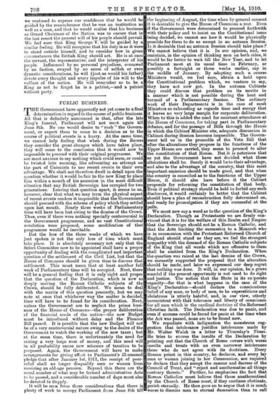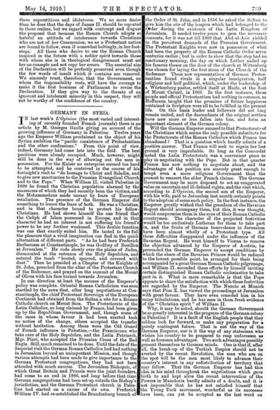PUBLIC BUSINESS.
E Government have apparently not yet come to a final determination in regard to the course of public business. All that is definitely announced is that, after the late King's funeral, Parliament will not meet again till June 8th. No one would desire to " rush " the Govern- ment, or expect them to come to a decision as to the course of political events in a hurry. At the same time, we cannot help feeling that when during the Recess they consider the great changes which have taken place, they will come to the conclusion that it would now be impossible to proceed with their original programme. We are most anxious to say nothing which could seem, or could be twisted into seeming, like advocating an attempt on the part of Unionists to use recent events to their own advantage. We shall not therefore dwell in detail upon the question whether it would be fair to the new King to place him within a month of his accession in the most difficult situation that any British Sovereign has occupied for two generations. Leaving that question apart, it seems to us, however, clear that what we may term the physical aspect of recent events renders it impossible that the Government should proceed with the scheme of policy which they settled upon last month. Nearly three weeks of Parliamentary time will have been lost owing to the demise of the Crown. Thus, even if there were nothing specially controversial in the Government programme, and no vast Constitutional revolution were proposed, some modification of that programme would be inevitable.
But the loss of the three weeks of which we have just spoken is not the only loss of time which must take place. It is absolutely necessary not only that the Select Committee now to be appointed shall have a proper opportunity of dealing with the complicated and important question of the settlement of the Civil List, but that the House of Commons should be given time to discuss that settlement. This must mean that at least another full week of Parliamentary time will be occupied. Next, there will be a general feeling that it is only right and proper that the question of the Declaration, which is now so deeply moving the Roman Catholic subjects of the Crown, should be fully deliberated. We mean to deal with the merits of this question presently, but we may note at once that whichever way the matter is decided, time will have to be found for its consideration. Next, unless the Government are to neglect the prime busi- ness of the House of Commons—the proper deliberation of the financial needs of the nation—the new Budget must be introduced without delay and the Finance Bill passed. It is possible that the new Budget will not be of a, very controversial nature owing to the desire of the Government to watch the working of the new taxes ; but at the same time, there is unfortunately the need for raising a very large sum of money, and this need will in all probability cause new schemes of taxation to be proposed. Again, the Government will have to make arrangements for giving effect to Parliament's ill-omened pledge that after January 1st, 1911, the receipt of poor- relief shall no longer disqualify men or women from receiving an old-age pension. Beyond this there are the nsual number of what may be termed administrative Acts to be passed, and a considerable number of days must also be devoted to Supply.
It will be seen from these considerations that there is plenty of work to occupy Parliament from June 8th till • the beginning of August, the time when by general consent it is desirable to give the House of Commons a rest. Even if the Government were determined to proceed forthwith with their policy and to insist on the Contitutional issue being decided, we cannot see how it would be physically possible for them to do so except in an autumn Session. Is it desirable that an autumn Session should take place ? We cannot believe that it is. In our opinion, and, we maintain, in the opinion of thinking men on both sides, it would be far better to wait till the New Year, and to let Parliament meet at its usual time in February, or possibly a fortnight or three weeks earlier, say in the middle of January. By adopting such a course Ministers would, we feel sure, obtain a hold upon the Constitutional problem which, we venture to say, they have not now got. In the autumn Cabinets they could discuss that problem on its merits in a manner which is not possible during the heat and turmoil of a Parliamentary Session. The ordinary work of their Departments is in the case of most Ministers so exhausting as regards time and energy that it leaves no very large margin for corporate deliberation. When to this is added the need for constant attendance at the House of Commons, for taking part in Parliamentary debates, and for the passage of Bills through the House in which the Cabinet Minister sits, adequate discussion in Cabinet during Session becomes impossible. The Govern- ment tell us in the preamble of the Veto Bill that after the alterations they propose in the functions of the Upper House are carried, they mean to proceed to alter the constitution of that House. But it is notorious that as yet the Government have not decided what those alterations shall be. Surely it would be to their advantage, and also to the advantage of the country, that this most important omission should be made good, and that when the country is consulted as to the functions of the Upper House, it should also have before it the Cabinet proposals for reforming the constitution of that body. Even if political strategy should be held to forbid any such disclosure, it would certainly be better that the Cabinet should have a plan of reconstruction fully determined on, and ready for promulgation if they are successful at the polls. We must now say a word as to the question of the King's Declaration. Though as Protestants we are firmly con- vinced that it is for the welfare of this Realm and Empire that the Sovereign should not be a Roman Catholic, and that the Acts limiting the succession to a Monarch who is in communion with the Protestant Reformed Church of England should stand as they are, we feel the strongest sympathy with the demand of the Roman Catholic subjects of the King that all words which are offensive to them shall be omitted from the King's Declaration. When the question was raised at the last demise of the Crown, we earnestly supported the proposal that the alteration should be made, and later we expressed our deep regret that nothing was done. It will, in our opinion, be a, grave scandal if the present opportunity is not used to do right and justice. The notion that the State in its cosporate capacity—for that is what happens in the case of the King's Declaration—should declare the conscientious belief of any man, or body of men, to be superstitious and idolatrous is utterly hateful, and, in our view, utterly inconsistent with that tolerance and liberty of conscience for all men which is the cardinal doctrine of the Reformed Christian faith. The Declaration was due to panic, and even if excuses could be found for panic at the time when the Act was passed, none are to-be found now. We repudiate with indignation the monstrous sug- gestion that intolerance justifies intolerance made by Mr. Walter Walsh in a letter to Thursday's Times. He tries to excuse the insults of the Declaration by pointing out that the Church of Rome covers with worse insults and treats with an even narrower intolerance those who do not agree with its doctrines. Every Roman priest in this country, he declares, and every lay man or woman joining in her Communion, are required to declare that they accept the canons and decrees of the Council of Trent, and "reject and anathematise all things contrary thereto." Further, he emphasises the fact that Roman Catholics must believe that those anathematised by the Church of Rome must, if they continue obstinate, perish eternally. He then goes on to argue that it is much worse to dismiss men to eternal damnation than to call them superstitious and idolatrous. We no more desire than he does that the days of James II. should be repeated in these realms, but we regard with contempt and disgust the proposal that because the Roman Church adopts so hateful an attitude of intolerance towards Christians who are not of her Communion, we as a Protestant nation are bound to follow, even if somewhat haltingly, in her foot- steps. All those who desire to see the Roman Church inspired in the future with a nobler spirit towards those with whom she is in theological disagreement must set her an example and not copy her errors. The essential aim of the Declaration will be perfectly preserved even though the few words of insult which it contains are removed. We sincerely trust, therefore, that the Government, on whom the responsibility rests, will have the courage to make it the first business of Parliament to revise the Declaration. If they give way to the threats of an ignorant and intolerant minority in this respect, they will not be worthy of the confidence of the country.







































 Previous page
Previous page